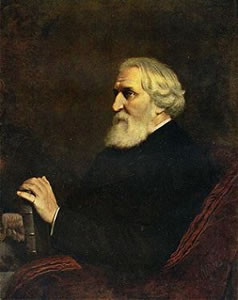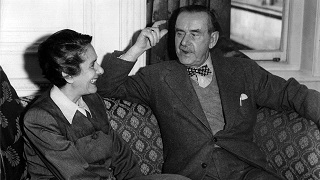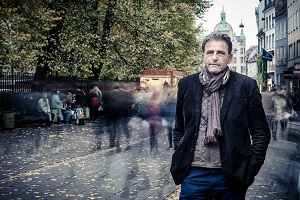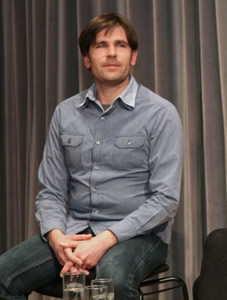|
De Russische schrijver Ivan Sergejevitsj Toergenjev werd geboren op 9 november 1818 in Orjol, in de Oekraïne. Zie ook mijn blog van 9 november 2010 en eveneens alle tags voor Ivan Toergenjev op dit blog.
Uit: Virgin Soil (Vertaald door R. S. Townsend)
“At one o'clock in the afternoon of a spring day in the year 1868, a young man of twenty-seven, carelessly and shabbily dressed, was toiling up the back staircase of a five-storied house on Officers Street in St. Petersburg. Noisily shuffling his down-trodden goloshes and slowly swinging his heavy, clumsy figure, the man at last reached the very top flight and stopped before a half-open door hanging off its hinges. He did not ring the bell, but gave a loud sigh and walked straight into a small, dark passage.
“Is Nejdanov at home?” he called out in a deep, loud voice.
“No, he’s not. I’m here. Come in,” an equally coarse woman’s voice responded from the adjoining room.
“Is that Mashurina?” asked the newcomer.
“Yes, it is I. Are you Ostrodumov?
“Pemien Ostrodumov,” he replied, carefully removing his goloshes, and hanging his shabby coat on a nail, he went into the room from whence issued the woman’s voice.
It was a narrow, untidy room, with dull green coloured walls, badly lighted by two dusty windows. The furnishings consisted of an iron bedstead standing in a corner, a table in the middle, several chairs, and a bookcase piled up with books. At the table sat a woman of about thirty. She was bareheaded, clad in a black stuff dress, and was smoking a cigarette. On catching sight of Ostrodumov she extended her broad, redhand without a word. He shook it, also without saying anything, dropped into a chair and pulled a half-broken cigar out of a side pocket. Mashurina gave him a light, and without exchanging a single word, or so much as looking at one another, they began sending out long, blue puffs into the stuffy room, already filled with smoke.
There was something similar about these two smokers, al- though their features were not a bit alike. In these two slov- enly figures, with their coarse lips, teeth, and nose.
Ostrodumov was even pock-marked), there was something honest and firm and persevering.
“Have you seen Nejdanov?” Ostrodumov asked.
“Yes. He will be back directly. He has gone to the library with some books.”

Ivan Toergenjev (9 november 1818 – 3 september 1883)
Portret door Vasily Perov, 1872
De Duitse schrijfster Erika Mann werd geboren op 9 november 1905 in München als oudste dochter van de Duitse schrijver Thomas Mann. Zie ook mijn blog van 9 november 2010 en eveneens alle tags voor Erika Mann op dit blog.
Uit: Erika Mann. Briefe und Antworten
"26. Mai 1947an Lotte Walter
„…es ist zur Zeit - völlig gleichgültig, wie man es macht - mit den Menschen nicht auszukommen, und je weniger man sich abgibt mit ihnen, desto besser, schonsamer (für alle) und, à la longue, aussichtsreicher. Meinst Du wirklich (der Gedanke verfolgt mich!), der Besuch, von welchem ich Dir abgeraten (ohne ihn freilich, als es ernst wurde, irgend sabotieren zu wollen) hätte alles, alles zum Besseren und Guten wenden können? Nie und nimmer hätte er dies gekonnt.“
(…)
22. September 1948 an Duff Cooper
Wäre ich amerikanische Staatsbürgerin gewesen, ich hätte mich nicht stärker bemühen können, dem Lande nützlich zu sein. In der Tat fühlte ich wie eine Amerikanerin, lebte wie eine Amerikanerin, war praktisch eine Amerikanerin. [...] Ich lebte und arbeitete nun einmal in den USA, und da ich dies auch weiterhin zu tun wünschte, hielt ich es nur für korrekt, mich dem guten Volk dieses Landes auch legal anzuschließen.“

Erika Mann (9 november 1905 - 27 augustus 1969)
Erika en Thomas Mann in Londen, 1947
De Deense schrijver Jens Christian Grøndahl werd geboren in Lyngby op 9 november 1959. Zie ook alle tags voor Jens Christian Grøndahl op dit blog.
Uit:Lucca (Vertaald door Anne Born)
“One evening in April a thirty-two-year-old woman, unconscious and severely injured, was admitted to the hospital in a provincial town south of Copenhagen. She had a concussion and internal bleeding, her legs and arms were broken in several places, and she had deep lesions in her face. A gas station attendant in a neighboring village, beside the bridge over the highway to Copenhagen, had seen her go the wrong way up the exit and drive at high speed into the oncoming traffic. The first three approaching cars managed to maneuver around her, but about 200 meters after the junction she collided head-on with a truck. The Dutch driver was admitted for observation but released the next day. According to his statement he started to brake a good 100 meters before the crash, while the car seemed to actually increase its speed over the last stretch. The front of the vehicle was totally crushed, part of the radiator was stuck between the road and the truck's bumper, and the woman had to be cut free. The spokesman for emergency services said it was a miracle she had survived. On arrival at the hospital the woman was in very critical condition, and it was twenty-four hours before she was out of serious danger. Her eyes were so badly damaged that she lost her sight. Her name was Lucca. Lucca Montale. Despite the name there was nothing particularly Italian about her appearance. She had auburn hair and green eyes in a narrow face with high cheek-bones. She was slim and fairly tall. It turned out she was Danish, born in Copenhagen. Her husband, Andreas Bark, arrived with their small son while she was still on the operating table. The couple's home was an isolated old farmhouse in the woods seven kilometers from the site of the accident. Andreas Bark told the police he had tried to stop his wife from driving. He thought she had just gone out for a breath of air when he heard the car start. By the time he got outside he saw it disappearing along the road. She had been drinking a lot. They had had a marital disagreement. Those were the words he used; he was not questioned further on that point. Early in the morning, when Lucca Montale was moved from the operating room into intensive care, her husband was still in the waiting room with the sleeping boy's head on his lap. He was looking out at the sky and the dark trees when Robert sat down next to him. Andreas Bark went on staring into the gray morning light with an exhausted, absent gaze”.

Jens Christian Grøndahl (Lyngby, 9 november 1959)
De Duitse schrijver Jan Decker werd geboren op 9 november 1977 in Kassel. Zie ook mijn blog van 9 november 2010 en eveneens alle tags voor Jan Decker op dit blog.
Uit: Vogelkunde für Städtebewohner
„An der Kreuzung ist Vorsicht geboten. Schon öfter musste Walther Lembeck einer geschwungenen Lederhandtasche ausweichen, die nicht ihm, sondern einem Weibchen des Nebenreviers galt. Heute verharrt das Biotop reglos. Man könnte von einem Wachsfigurenkabinett der Prostituierten sprechen, das er jeden Morgen auf dem Weg zu den Stadtvögeln durchstreift. Und so weit reicht Frau Sperlings Blick vom Balkon. Dann zieht sie sich vermutlich zufrieden und bestätigt in ihre Wohnung zurück. Schau an, hört er Frau Sperling sagen. Walther Lembeck macht wieder Nuttensafari.
Eine neue Vogelstimme ist zu hören. Walther Lembeck geht flink weiter. Der Buntspecht kann es nicht sein, der ist abgeflattert. Walther Lembeck hört aufmerksam hin. Natürlich, es ist das durchdringende Twiht des Kleibers. Hier in den ausgefaulten Astlöchern der Straßenbäume liegen seine Brutplätze. Sie sind das erste Ziel seines Morgenspaziergangs. Ausgerechnet hier an der Kreuzung streift der schnurrende Jäger umher, den sich Frau Sperling hält. Als hätten die beiden sich verabredet. Walther Lembeck scheucht Frau Sperlings Katze mit einem beherzten Tritt auf die Kreuzung. Autoreifen quietschen. Da fliegt der Kleiber fröhlich auf das Astloch zu, im Schnabel klumpenweise frisches Baumaterial. Der zweite Standvogel des Tages, und das dritte Exemplar einer Art, der sich Walther Lembeck selbst zuschreibt. Dem gefiederten Flaneur, der unter widrigen Bedingungen in der Stadt ausharrt..
Denn was lauert am Stadtrand? Die Langeweile. Der Stadtvogel dagegen zeigt, wie man inmitten all des Lärms sein eigenes Biotop bestellen kann, trotz der gackernden Gegenwart von Städtebewohnern wie Frau Sperling. Und der Stadtvogel weiß sich zu wehren, indem er die Städtebewohner imitiert. Er dreht, nicht anders als Frau Sperling, die Lautstärke auf. So hört Walther Lembeck es jeden Morgen mit eigenen Ohren, das Trommeln des Buntspechts, das Teck-Teck des Gartenrotschwanzes, das Tsiwit der Rauchschwalbe, das weiche Hui des Fitis, in zehnfacher Lautstärke. Die Stadtvögel haben ihr Biotop gefunden, nur wissen es die Städtebewohner noch nicht.“

Jan Decker (Kassel, 9 november 1977)
De Engelse dichter en schrijver Roger Joseph McGough werd geboren op 9 november 1937 in Litherland, Lancashire. Zie ook alle tags voorRoger McGough op dit blog enook mijn blog van 9 november 2010.
Soil
we've ignored eachother for a long time
and I'm strictly an indoor man
anytime to call would be the wrong time
I'll avoid you as long as I can
When I was a boy we were good friends
I made pies out of you when you were wet
And in childhood's remembered summer weather
We roughandtumbled together
We were very close
just you and me and the sun
the world a place for having fun
always so much to be done
But gradually I grew away from you
Of course you were still there
During my earliest sexcapades
When I roughandfumbled
Not very well after bedtime
But suddenly it was winter
And you seemed so cold and dirty
That I stayed indoors and acquired
A taste for girls and clean clothes
we found less and less to say
you were jealous so one day
I simply upped and moved away
I still called to see you on occasions
But we had little now in common
And my visits grew less frequent
Until finally
One coldbright April morning
A handful of you drummed
On my fathers waxworked coffin
at last it all made sense
there was no need for pretence
you said nothing in defence
And now recently
While travelling from town to town
Past where you live
I have become increasingly aware
Of you watching me out there.
Patient and unforgiving
Toying with the trees.
we've avoided eachother for a long time
and I'm strictly a city man
anytime to call would be the wrong time
I'll avoid you as long as I can.

Roger McGough (Litherland, 9 november 1937)
De Engelse dichteres en schrijfster Anne Sexton werd geboren op 9 november 1928 in Newton, Massachusetts. Zie ook mijn blog van 9 november 2010 en eveneens alle tags voor Anne Sexton op dit blog.
Barefoot
Loving me with my shoes off
means loving my long brown legs,
sweet dears, as good as spoons;
and my feet, those two children
let out to play naked. Intricate nubs,
my toes. No longer bound.
And what's more, see toenails and
all ten stages, root by root.
All spirited and wild, this little
piggy went to market and this little piggy
stayed. Long brown legs and long brown toes.
Further up, my darling, the woman
is calling her secrets, little houses,
little tongues that tell you.
There is no one else but us
in this house on the land spit.
The sea wears a bell in its navel.
And I'm your barefoot wench for a
whole week. Do you care for salami?
No. You'd rather not have a scotch?
No. You don't really drink. You do
drink me. The gulls kill fish,
crying out like three-year-olds.
The surf's a narcotic, calling out,
I am, I am, I am
all night long. Barefoot,
I drum up and down your back.
In the morning I run from door to door
of the cabin playing chase me.
Now you grab me by the ankles.
Now you work your way up the legs
and come to pierce me at my hunger mark.

Anne Sexton (9 november 1928 – 4 oktober 1974)
Zie voor nog meer schrijvers van de 9e november ook mijn blog van 9 november 2014 deel 1 en eveneens deel 2.
|



